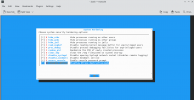Thank you smithi. My capacity to read and understand man pages such as
sh(1) is extremely, extremely limited. I run
ls and
doas and the rest I copy and paste.
Well, virtually all of the main system scripts are written in
sh, so you will find that reading and studying this language essential to successful mastery of FreeBSD at any level.
That said, bsd{install.config} are pretty extreme in pushing
sh(1) to its limits, and I should not have suggested it as an example; I'm still struggling to make sense of the
broken bsdconfig packages code on 12.3-R dvd1.
Sorry to be frank, but copying stuff because 'hardening' sounds cool may be worse than leaving it alone in some cases, unless or until you know more or less precisely what each of those settings accomplishes.
I gather that your system is not likely a server, open to the world with multiple unrelated users? Perhaps making sure your firewall is tight is your best bet for online security?
Do I have to copy what is missing in one file, everything, from another AND vice versa? i.e, should both the / and /etc files have exactly the same contents?
No, the files dropped in / are just extra bits to add to the appropriate files. Best delete or move them afterwards.
Your diffs here and elsewhere show your rc.conf and ttys at least already included many of those options.
How do I make pf auto-start on boot, everytime?
Sorry, I can't help with pf, having used ipfw since 1998.
Cheers

